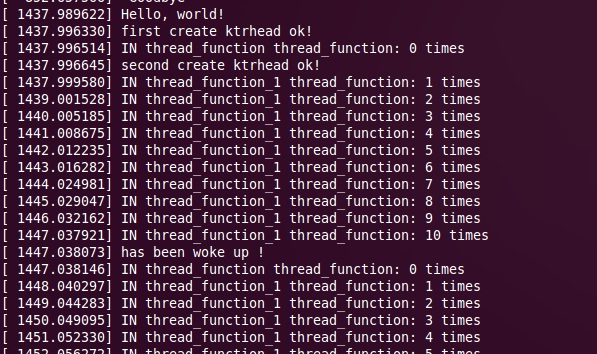本文摘自
http://www.cnblogs.com/zhuyp1015/archive/2012/06/13/2548458.html
接上 一篇文章 ,这里介绍另一种线程间通信的方式:completion机制。Completion机制是线程间通信的一种轻量级机制:允许一个线程告诉另一个线程工作已经完成。为使用 completion, 需要包含头文件 <linux/completion.h>。
可以通过以下方式来创建一个 completion :
DECLARE_COMPLETION(my_completion);
或者, 动态创建和初始化:
struct completion my_completion;
init_completion(&my_completion);
等待 completion 是一个简单事来调用: void wait_for_completion(struct completion *c);
注意:这个函数进行一个不可打断的等待. 如果你的代码调用 wait_for_completion 并且
没有人完成这个任务, 结果会是一个不可杀死的进程。
completion 事件可能通过调用下列之一来发出:
void complete(struct completion *c);
void complete_all(struct completion *c);
如果多于一个线程在等待同一个 completion 事件, 这 2 个函数做法不同. complete 只
唤醒一个等待的线程, 而 complete_all 允许它们所有都继续。
下面来看使用completion机制的实现代码:
#include <linux/init.h> #include <linux/module.h> #include <linux/kthread.h> #include <linux/wait.h> #include <linux/completion.h> MODULE_LICENSE("Dual BSD/GPL"); static struct completion comp; static struct task_struct * _tsk; static struct task_struct * _tsk1; static int tc = 0; static int thread_function(void *data) { do { printk(KERN_INFO "IN thread_function thread_function: %d times ", tc); wait_for_completion(&comp); //tc = 0; ///在哪里都行 printk(KERN_INFO "has been woke up ! "); }while(!kthread_should_stop()); return tc; } static int thread_function_1(void *data) { do { printk(KERN_INFO "IN thread_function_1 thread_function: %d times ", ++tc); if(tc == 10) { complete(&comp); tc = 0; } msleep_interruptible(1000); }while(!kthread_should_stop()); return tc; } static int hello_init(void) { printk(KERN_INFO "Hello, world! "); init_completion(&comp); _tsk = kthread_run(thread_function, NULL, "mythread"); if (IS_ERR(_tsk)) { printk(KERN_INFO "first create kthread failed! "); } else { printk(KERN_INFO "first create ktrhead ok! "); } _tsk1 = kthread_run(thread_function_1,NULL, "mythread2"); if (IS_ERR(_tsk1)) { printk(KERN_INFO "second create kthread failed! "); } else { printk(KERN_INFO "second create ktrhead ok! "); } return 0; } static void hello_exit(void) { printk(KERN_INFO "Hello, exit! "); if (!IS_ERR(_tsk)){ int ret = kthread_stop(_tsk); printk(KERN_INFO "First thread function has stopped ,return %d ", ret); } if(!IS_ERR(_tsk1)) { int ret = kthread_stop(_tsk1); printk(KERN_INFO "Second thread function_1 has stopped ,return %d ",ret); } } module_init(hello_init); module_exit(hello_exit);
运行结果:
